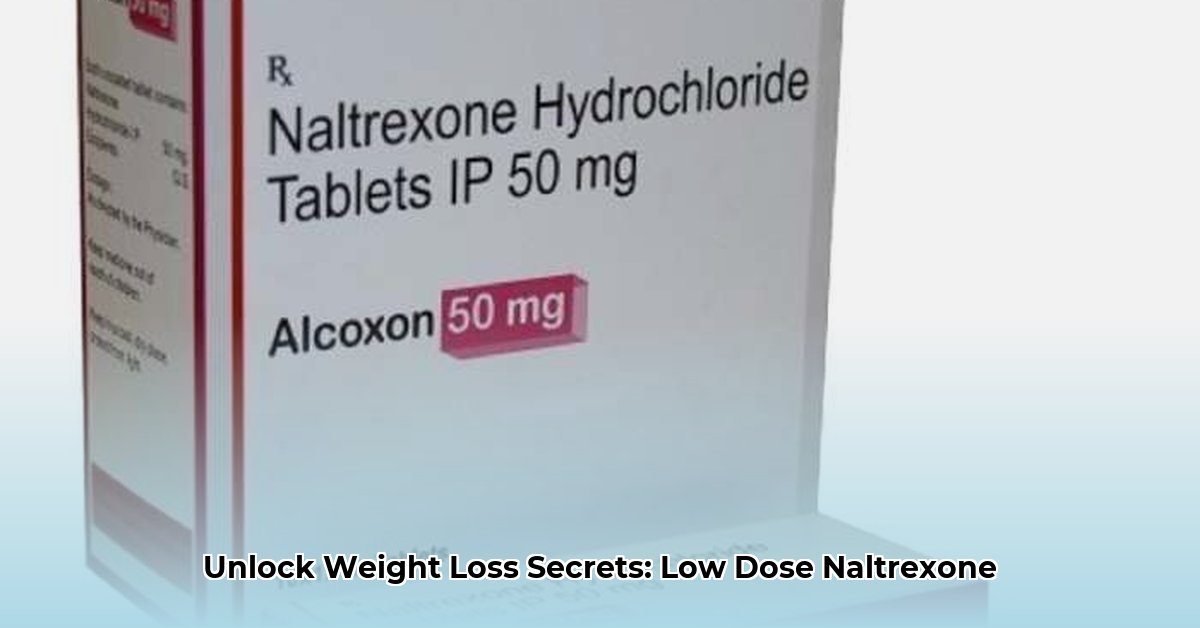
Low-dose naltrexone (LDN), a medication typically used at much lower doses than those employed for opioid addiction, has shown some promise in assisting with weight loss. However, it's crucial to understand that LDN is not an FDA-approved treatment for weight loss and its efficacy remains under investigation. This guide provides information to help you understand LDN's potential role in weight management, its potential benefits and risks, and most importantly, how to discuss its use with your healthcare provider. Remember, this information is for educational purposes only and should not be considered medical advice.
Understanding Low-Dose Naltrexone (LDN) and Weight Loss
LDN's mechanism of action in weight loss isn't fully understood. The current hypothesis suggests that by briefly blocking opioid receptors at low doses, LDN might influence various physiological processes related to appetite, metabolism, and inflammation—all factors that can impact weight. Some preliminary research indicates potential benefits, but robust, large-scale clinical trials are needed to definitively establish its effectiveness and safety for weight loss. Many questions remain unanswered, and further research is crucial. Could LDN be a valuable addition to your weight management plan? Let's carefully explore the possibilities.
Low Dose Naltrexone Weight Loss Dosage: A Practical Guide
There's no standardized LDN dosage for weight loss. The appropriate starting dose and subsequent adjustments are determined solely by your doctor based on your individual health status and response to the medication. Typical starting doses are very low (e.g., 0.5mg), gradually increasing as tolerated. The medication is usually taken once daily, often before bedtime, although this can vary based on individual needs. Crucially, never attempt to self-prescribe LDN.
Important Note: This information is for educational purposes only. The precise dosage and administration schedule must be determined and monitored by your doctor.
Potential Benefits and Risks of LDN for Weight Loss
While some studies suggest possible links between LDN and weight loss, the existing evidence isn't conclusive. It's vital to approach this with realistic expectations. LDN might contribute positively to weight management for some individuals, but it's not a guaranteed solution.
Potential Benefits (Based on Limited Evidence):
- Appetite Regulation: LDN may help regulate appetite by influencing opioid receptors involved in hunger and satiety.
- Metabolic Function: Some theoretical mechanisms suggest LDN could positively affect metabolic processes, although this needs further investigation.
- Inflammation Reduction: Preliminary evidence hints at possible anti-inflammatory effects, which could play an indirect role in weight management, as chronic inflammation is often linked to weight gain.
Potential Risks:
While generally well-tolerated, potential side effects of LDN can include:
- Nausea
- Fatigue
- Vivid dreams
- Headache
- Dizziness
More serious side effects are rare, but immediate medical attention is necessary should they occur. Always report any concerning symptoms to your doctor.
Contraindications and Drug Interactions
LDN is not suitable for everyone. Individuals with specific health conditions, including severe liver or kidney disease, should generally avoid LDN. It's also important to be aware of potential interactions with other medications, especially opioids. A thorough discussion with your doctor about your complete medical history, including current medications and supplements, is absolutely essential before considering LDN.
Have you considered the potential interactions of LDN with other medications? This is a critical aspect of safety and efficacy.
Finding a Healthcare Professional and Discussion Guide
Finding a physician experienced in using LDN for weight management will likely require some searching. Don't hesitate to inquire about a doctor's experience with LDN and their approach to its use in weight loss. Preparing a list of questions for your consultation can ensure a more effective and informative discussion. Here are some sample questions:
- What's your experience prescribing LDN for weight loss?
- What are the potential benefits and risks of LDN for me, considering my medical history and other medications?
- What's the recommended starting dosage, and how will you monitor my progress and adjust the dosage?
- What lifestyle changes do you recommend combining with LDN therapy?
Conclusion: A Holistic Approach to Weight Management
LDN's role in weight loss requires further research. This information should not be interpreted as a self-treatment plan. Always consult your doctor before starting LDN or any new weight loss strategy. A balanced approach incorporating diet, exercise, stress management, and adequate sleep is crucial for effective and sustainable weight management, regardless of medication usage. Remember that your healthcare provider is your partner in making informed decisions about your health and well-being. What steps will you take today to prioritize your health?